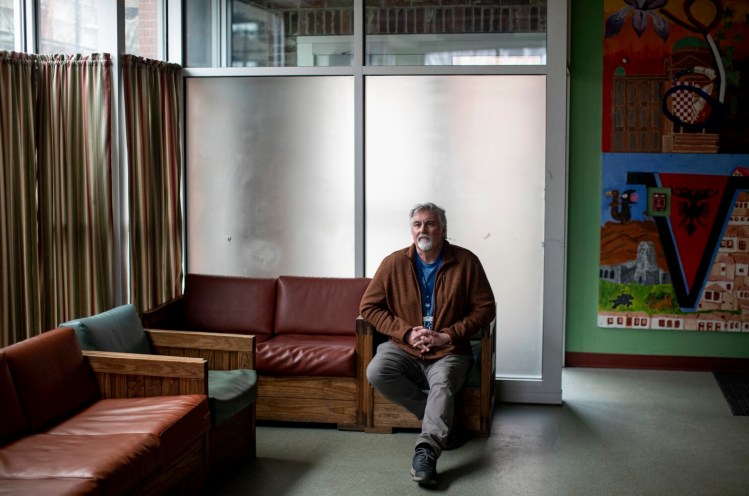Last month, Preble Street in Portland started paying its employees time and a half for working on the front lines in its homeless shelters and food pantries during the pandemic.
“I think it’s the best decision we ever made,” CEO Mark Swann said. “I think it really did acknowledge the hard work of the staff and acknowledge the potential financial hardships they might be in.”
But that decision comes at a cost – $150,000 a month. For Preble Street and other nonprofits on the front lines during the pandemic, it is too soon to know what the financial consequences of the coronavirus will be.
The Maine Association of Nonprofits has said nearly 3,000 charitable nonprofits in Maine file financial reports to the federal government on a regular basis, and those organizations employ nearly 100,000 people. More than one-third work in the health and human services sector – taking care of people who are elderly, who have a disability or mental health challenges, who are food-insecure.
More than 350 organizations responded to an association survey last month about the pandemic. Three-quarters said they anticipated significant impacts on their programs and finances, and one of the major concerns was budget implications in a strained economy.
Jennifer Hutchins, the association’s executive director, highlighted the philanthropic organizations that have been making donations of varying sizes to nonprofits trying to manage the coronavirus. The Maine Community Foundation and the United Ways, for example, have been raising money for emergency response funds and making donations to community organizations. And Hutchins said grantors have been allowing nonprofits to be more flexible in how they use that money during the pandemic.
Some nonprofits have been able to access financial relief from the government, but others have found barriers like access to the right banks. Some pay into the state’s unemployment insurance program, while others are overwhelmed by claims from their former employees because they self-insured. So Hutchins said the association is still working with elected officials to address those concerns.
“There are some unique characteristics for the nonprofit community that don’t get addressed with just a strict business lens,” Hutchins said.
Erin Fogg, the vice president of development and communications at Good Shepherd Food Bank in Auburn, said the organization recently created a model for the coming months based on its increased costs and an expected increase in food insecurity.
Typically, 70 percent of the food at Good Shepherd comes from retail donations. But those donations have dropped as consumers are stocking up on supplies and not dining out. So the food bank spent $2 million on food during the first month of its coronavirus response, which is more than double the budget for shelf-stable food in an entire year. The nonprofit also decided to increase pay for warehouse workers and truck drivers, and extra cleaning has come with costs too.
And the pandemic is already increasing demand at most food pantries. Last fall, nearly 180,000 people in Maine were experiencing food insecurity. Good Shepherd is estimating the pandemic will increase that number by 67,000, or 38 percent.
Based on those data, the food bank will spend $6.3 million on its coronavirus response over six months.
“For those Mainers who were already experiencing food insecurity, their situations may be worsening at this point, and they may be needing more help,” Fogg said. “And we know that thousand and thousands of more Mainers are struggling to put meals on the table.”
Fogg said donations have gotten the food bank halfway to that fundraising goal — from $5 contributions to a $1 million grant from the Harold Alfond Foundation. Good Shepherd also applied for and received funding through the Paycheck Protection Program. L.L. Bean is using its Freeport shipping hub to pack help pack food boxes.
“We can make cost estimates as best we can,” Fogg said. “We won’t know until this plays out how the response will continue. Our donors are really understanding. I think it’s showing the best of Mainers right now and their intentions to help.”
At Preble Street, Swann said the nonprofit does not do much direct fundraising. But for the first time, the organization recorded a video message and asked for donations to support its coronavirus response. In less than a week, Preble Street had received more than $65,000.
“We certainly have seen an increase in the donations,” Swann said. “The question remains to be seen, is it going to be enough to cover our increased expenses?”
For nonprofits that oversee multiple programs, the impacts have been varied even within the organization.
At Catholic Charities of Maine, the pandemic has forced nine of 24 programs to shut down. The nonprofit normally has a staff of more than 480 full- and part-time employees. It furloughed 90 people and reduced hours for another 90.
But CEO Steve Letourneau said the Paycheck Protection Program will allow Catholic Charities to rehire most of those employees, even if they are reassigned to new programs, and it will allow the nonprofit to consider hazard pay.
“We do a little bit of all kinds of things,” Letourneau said. “I think what’s unique in our case is every single program, our response has been unique.”
As the shutdown continues, Hutchins said the Maine Association of Nonprofits is fielding more questions from organizations that provide cultural programming, like arts institutions or youth camps. They wonder how to move planned fundraising events to online venues or whether they can plan to open in the summer.
“Every day, we have to give everyone the caveat that we’re sharing with them the most and the best that we possibly can right now, but that tomorrow might be totally different,” Hutchins said.
Send questions/comments to the editors.




Comments are no longer available on this story